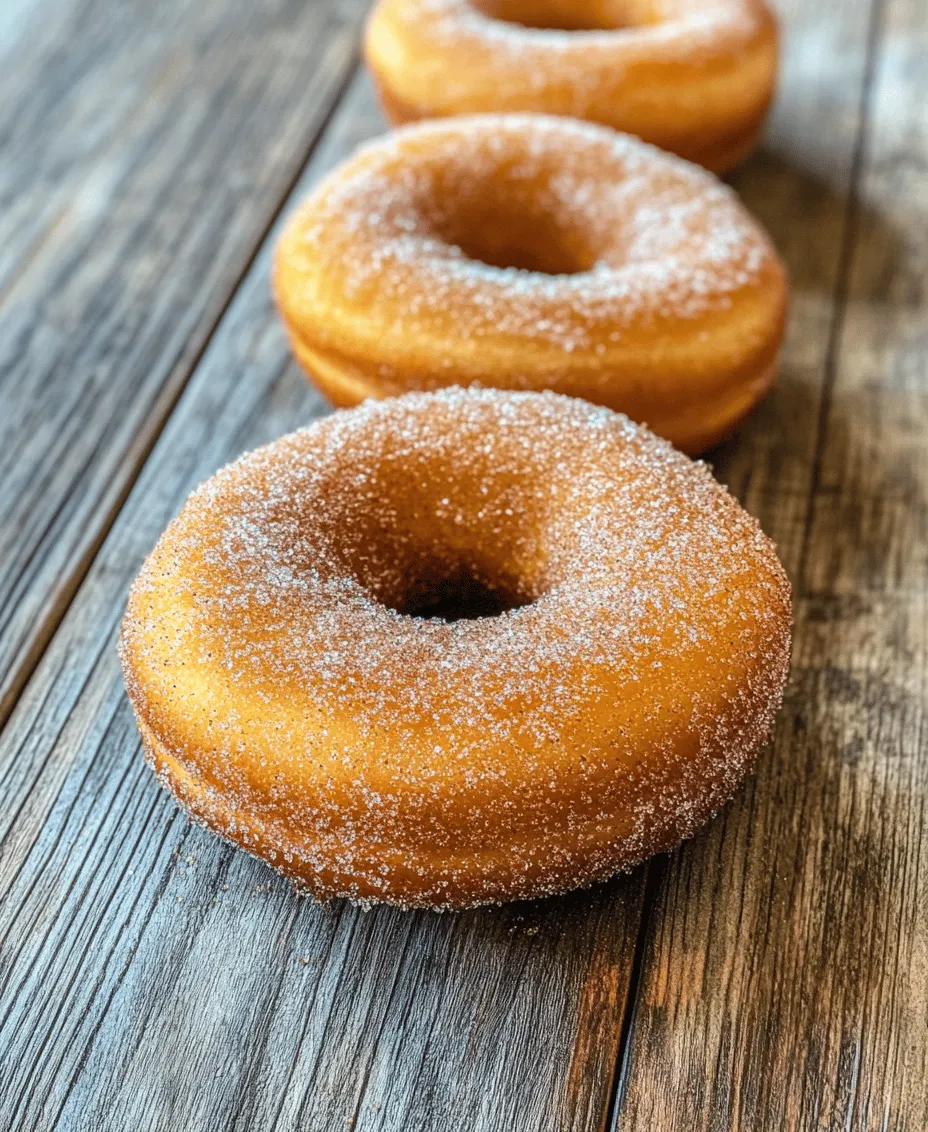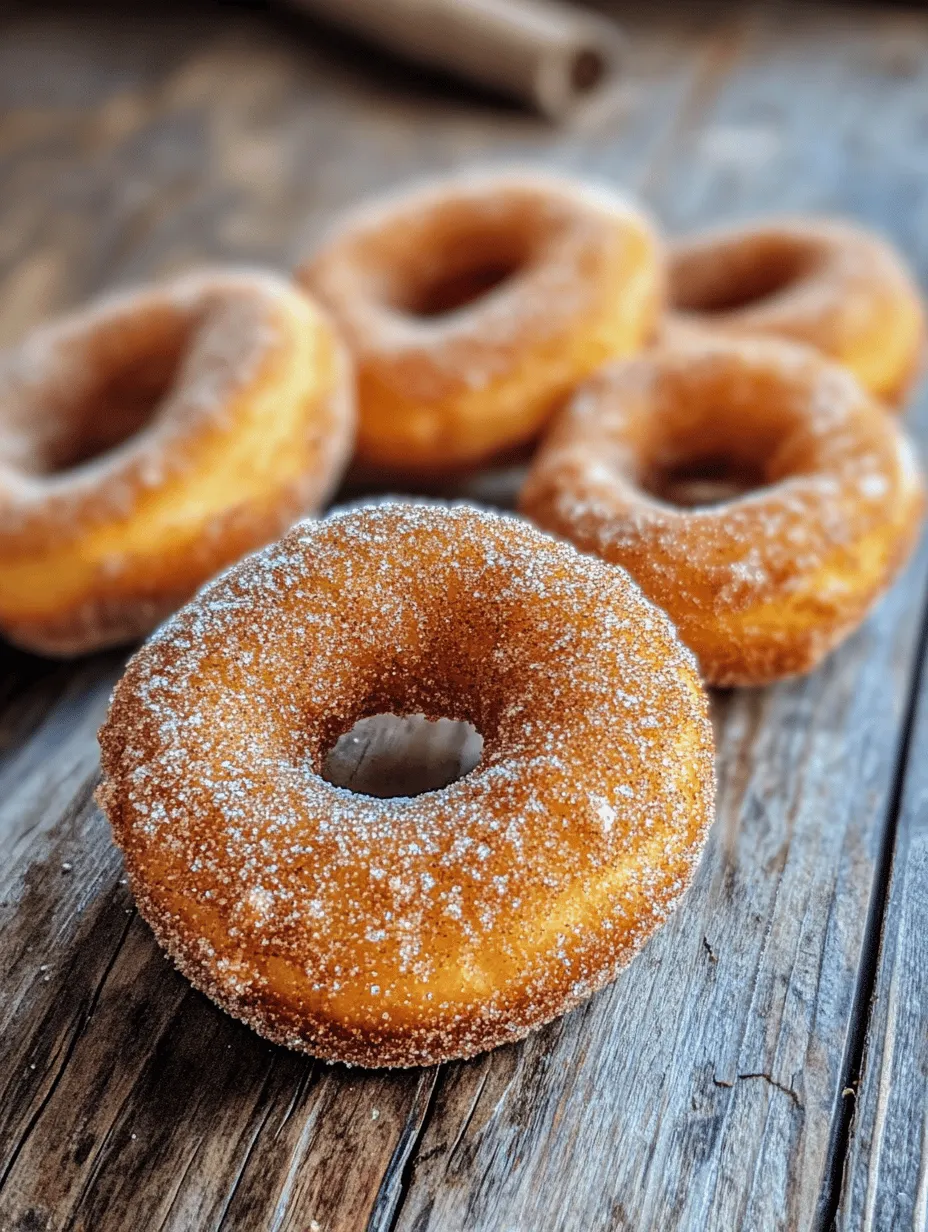Introduction
As the leaves begin to change and the crispness of autumn fills the air, few treats evoke the warmth and nostalgia of the season quite like apple cider donuts. These delightful confections are a cherished staple at fall festivals and farm stands, celebrated for their sweet, spiced flavor that mirrors the essence of the harvest season. Homemade apple cider donuts, in particular, elevate this beloved treat to new heights, allowing you to control the ingredients and flavor profiles while filling your kitchen with the enchanting aroma of spiced apples.
At the heart of this irresistible recipe is the use of reduced apple cider, which intensifies the flavor and ensures that each bite is bursting with the essence of autumn. The process of creating these donuts is not only rewarding but also a wonderful way to gather friends and family in the kitchen, sharing in the joy of baking and the anticipation of enjoying warm, freshly made donuts. In this article, we will delve into the history, significance, and delightful ingredients that make apple cider donuts a must-try fall recipe, followed by a step-by-step guide to creating your own batch.
The Significance of Apple Cider in Baking
Apple cider is not just a seasonal beverage; it plays a vital role in baking, particularly when it comes to enhancing flavors in treats like donuts. Made from pressed and fermented apples, apple cider offers a unique blend of sweetness and acidity that can transform ordinary baked goods into extraordinary delights. The natural sugars in apple cider caramelize beautifully during the baking process, adding depth and complexity to the flavor profile of your donuts.
Beyond its delicious taste, apple cider is packed with nutritional benefits. Rich in antioxidants and vitamins, it can contribute to a healthy diet when enjoyed in moderation. The polyphenols found in apple cider may help reduce inflammation and support heart health, making it a wholesome addition to your fall baking repertoire.
Historically, apple cider donuts have deep roots in American cuisine, particularly in the Northeast, where apple orchards abound. These donuts have become synonymous with autumn festivals and community gatherings, symbolizing the bounty of the harvest and the joy of togetherness. As you prepare to make your apple cider donuts, you’ll not only be creating a delicious treat but also participating in a time-honored tradition that celebrates the flavors of the season.
Ingredients Breakdown
Creating the perfect apple cider donuts starts with understanding the ingredients that come together to form this delightful treat. Each component plays a crucial role in achieving the desired texture, flavor, and overall success of the recipe. Here’s a detailed look at the key ingredients you’ll need:
Apple Cider
The star of our recipe is, of course, apple cider. It is essential to use fresh apple cider, which can usually be found at local orchards or farmers’ markets during the fall season. To intensify the flavor of the donuts, the apple cider must be reduced. This process involves simmering the cider to concentrate its flavors and sugars, resulting in a rich and robust base for the donuts. The reduction also helps to prevent excess moisture in the batter, ensuring a perfect donut texture.
All-Purpose Flour
All-purpose flour is the backbone of the donut batter, providing the structure and stability necessary for a light and fluffy texture. The right amount of flour is crucial; too much will lead to dense donuts, while too little may cause them to fall apart. For the best results, it is recommended to spoon the flour into your measuring cup and level it off rather than scooping directly from the bag, which can compact the flour and result in inaccurate measurements.
Granulated Sugar
Granulated sugar not only adds sweetness but also enhances the overall flavor of the donuts. It works in harmony with the apple cider and spices, creating a balanced taste that is neither too sweet nor too bland. When combined with the wet ingredients, sugar helps to create a tender crumb by incorporating air into the batter.
Baking Powder and Baking Soda
Both baking powder and baking soda serve as leavening agents in this recipe. Baking powder is a double-acting leavening agent that reacts in two stages: once when combined with wet ingredients and again when exposed to heat. It helps the donuts rise and develop a light, airy texture. Baking soda, on the other hand, requires an acid to activate, which in this case comes from the apple cider and buttermilk. The combination of these two leavening agents ensures that the donuts are perfectly fluffy and not overly dense.
Ground Cinnamon and Nutmeg
Cinnamon and nutmeg are classic spices that evoke the comforting essence of fall. In our apple cider donuts, these spices contribute warmth and depth, complementing the sweetness of the apple cider and sugar. Freshly grated nutmeg can elevate the flavor even further, as pre-ground nutmeg tends to lose its potency over time. These spices not only enhance the taste but also create an inviting aroma that will fill your kitchen as the donuts bake.
Salt
While it may seem counterintuitive to add salt to a sweet recipe, salt plays a critical role in balancing flavors. Just a pinch of salt helps to enhance the sweetness of the sugar and spices, preventing the donuts from tasting one-dimensional. It also contributes to the overall flavor profile, ensuring that every bite is well-rounded and satisfying.
Unsalted Butter
Unsalted butter adds richness and moisture to the donut batter, resulting in a tender and delicious final product. Using unsalted butter allows you to have better control over the salt content in your recipe. Be sure to melt the butter gently to avoid burning, and allow it to cool slightly before adding it to the batter to maintain the integrity of the mixture.
Buttermilk
Buttermilk is another essential ingredient in our recipe, providing tenderness and a slight tang that complements the sweetness of the donuts. The acidity in buttermilk not only reacts with the baking soda to create lift but also contributes to a moist crumb. If you don’t have buttermilk on hand, you can easily make a substitute by adding a tablespoon of white vinegar or lemon juice to a cup of milk and letting it sit for a few minutes until it thickens.
Vanilla Extract
A splash of vanilla extract enhances the overall flavor of the donuts, adding a sweet and aromatic note that pairs beautifully with the apple cider and spices. Opt for pure vanilla extract for the best flavor, as imitation vanilla can lack the depth and complexity of the real thing.
Cinnamon Sugar Coating
To elevate your apple cider donuts even further, a generous coating of cinnamon sugar is essential. This mixture of granulated sugar and ground cinnamon adds an extra layer of flavor and texture to the finished donuts, creating a delightful contrast between the fluffy interior and the sweet, spiced exterior. The coating not only makes the donuts visually appealing but also provides a satisfying crunch that complements the soft, tender donut.
Step-by-Step Instructions
Now that we have a thorough understanding of each ingredient and its significance in our apple cider donuts, let’s dive into the step-by-step instructions for making these irresistible treats.
1. Reduce the Apple Cider: Begin by pouring about two cups of fresh apple cider into a saucepan. Bring it to a boil over medium heat, then reduce the heat to a simmer. Allow the cider to simmer until it reduces to about one cup, stirring occasionally. This process should take about 15-20 minutes. The reduced cider should be thick and syrupy. Remove it from the heat and let it cool to room temperature.
2. Preheat the Oven: While the cider is cooling, preheat your oven to 350°F (175°C). Grease a donut pan with non-stick cooking spray or butter, ensuring that each cavity is well-coated to prevent sticking.
3. Combine Dry Ingredients: In a separate bowl, whisk together the all-purpose flour, baking powder, baking soda, cinnamon, nutmeg, and salt. This helps to evenly distribute the leavening agents and spices throughout the flour, ensuring a consistent flavor and texture in the donuts.
4. Mix Wet Ingredients: In a large mixing bowl, combine the melted unsalted butter, granulated sugar, and reduced apple cider. Mix until smooth. Add the buttermilk, eggs, and vanilla extract, whisking until well blended. The mixture should be creamy and homogeneous, with no lumps remaining.
5. Incorporate Dry Ingredients: Gradually add the dry ingredient mixture to the wet ingredients, folding gently to combine. Be careful not to overmix, as this can lead to dense donuts. The batter should be thick but pourable, with just a few lumps remaining.
6. Fill the Donut Pan: Using a piping bag or a zip-top bag with a corner snipped off, carefully fill each donut cavity about two-thirds full with batter. This allows room for the donuts to rise without overflowing during baking.
7. Bake: Place the filled donut pan in the preheated oven and bake for 10-12 minutes, or until the donuts spring back when lightly touched and a toothpick inserted into the center comes out clean. The donuts should be lightly golden around the edges.
8. Cool and Coat: Once baked, remove the donuts from the oven and allow them to cool in the pan for about 5 minutes before transferring them to a wire rack. While the donuts are still warm, roll them in the cinnamon sugar coating, ensuring they are thoroughly covered for that perfect sweet finish.
By following these steps, you’ll soon have a batch of warm, homemade apple cider donuts that embody the flavors of autumn and create memorable moments with family and friends. Enjoy the process, and savor the delightful results!

Detailed Walkthrough of Each Step in the Recipe
Reducing Apple Cider
To achieve the concentrated flavor that sets apple cider donuts apart, it’s essential to reduce the apple cider properly. Start by pouring about 2 cups of fresh apple cider into a saucepan. Heat it over medium-high heat, allowing it to come to a gentle boil. As the cider boils, it will start to foam; reduce the heat to medium and let it simmer. Stir occasionally to prevent the cider from sticking to the bottom of the pan. You want to reduce the cider by about half, which should take approximately 15-20 minutes. The goal is to achieve a syrupy consistency that will enhance the flavor of your donuts without making them soggy. Once reduced, allow the cider to cool slightly before incorporating it into your wet ingredients.
Preheating the Oven and Preparing the Donut Pan
Preheating the oven is a crucial step that ensures your donuts bake evenly. Set your oven to 350°F (175°C) and give it at least 10-15 minutes to reach the desired temperature. While the oven is heating, prepare your donut pan by greasing it with cooking spray or butter. Using a non-stick donut pan is ideal, but if you’re using a traditional metal pan, make sure to coat it generously to prevent sticking. Proper greasing, along with the right baking temperature, ensures that your donuts will come out perfectly shaped and easy to remove.
Mixing Dry Ingredients
In a large mixing bowl, combine your dry ingredients: flour, baking powder, baking soda, cinnamon, nutmeg, and salt. Whisk them together thoroughly to ensure an even distribution of the leavening agents and spices. This step is crucial for preventing lumps and ensuring that every bite of your donut is perfectly seasoned. If possible, sift the flour before measuring it to aerate it, which can lead to a lighter donut texture.
Combining Wet Ingredients
In another bowl, whisk together the wet ingredients: the cooled apple cider, eggs, melted butter, and vanilla extract. Ensure that the melted butter has cooled to room temperature before mixing it with the eggs; this prevents the eggs from cooking. The mixture should be smooth and homogenous, with a slightly thick texture. It’s essential to achieve this consistency as it contributes to the overall mouthfeel of the donuts.
The Gentle Folding Technique
Once both the wet and dry mixtures are prepared, it’s time to combine them. Gently fold the wet ingredients into the dry ingredients using a spatula. Start by making a well in the center of the dry ingredients and pour in the wet mixture. Use a folding motion, bringing the dry ingredients from the bottom of the bowl over the wet ingredients. Be careful not to overmix; a few lumps are perfectly fine. Overmixing can lead to dense donuts, so aim for a batter that is just combined.
Filling the Donut Pan
To achieve evenly shaped donuts, fill the prepared donut pan with the batter. You can use a piping bag for this task, which allows for precise control and less mess. If you don’t have a piping bag, a spoon or an ice cream scoop will work as well. Fill each cavity about two-thirds full to allow room for the donuts to rise without overflowing. Smooth the tops with a spatula for a clean finish.
Baking Tips
Place the filled donut pan in the preheated oven and bake for 10-12 minutes. To check for doneness, insert a toothpick into the center of a donut; it should come out clean or with just a few moist crumbs. Avoid opening the oven door too often, as this can lead to uneven baking. Once done, allow the donuts to cool in the pan for a few minutes before transferring them to a wire rack to cool completely.
Coating in Cinnamon Sugar
While the donuts are cooling, prepare the cinnamon sugar coating by mixing granulated sugar with ground cinnamon in a shallow bowl. Once the donuts have cooled for about 5 minutes, roll them in the cinnamon sugar while they are still warm. This allows the sugar to adhere better, creating a flavorful crust. For an extra touch, consider brushing the donuts lightly with melted butter before rolling them in the sugar, enhancing both flavor and texture.
Serving Suggestions and Pairings
These irresistible apple cider donuts are not only a treat on their own but also pair wonderfully with a variety of accompaniments. For a cozy experience, serve them alongside warm apple cider or a steaming cup of coffee. The warm beverages enhance the spices in the donuts and create a comforting atmosphere, perfect for chilly autumn days.
For those who love indulgence, consider drizzling the donuts with a caramel or chocolate glaze. Simply melt your choice of glaze and dip the tops of the donuts or drizzle it over them for an elevated treat. You can also experiment with toppings such as crushed nuts or sprinkles for added texture and flavor.
When hosting gatherings or special occasions, present the donuts creatively. Arrange them on a rustic wooden board or tiered cake stand, garnishing with fresh apple slices or cinnamon sticks for a seasonal touch. This not only makes for an inviting display but also encourages guests to indulge in the delightful flavors of fall.
Storage and Shelf Life
To maintain the freshness of your apple cider donuts, it’s essential to store them properly. Allow the donuts to cool completely before placing them in an airtight container. They can be stored at room temperature for up to 2 days. If you want to keep them longer, consider refrigerating them, which can extend their shelf life to about a week.
For those who find themselves with leftover donuts, reheating them is simple. Preheat your oven to 350°F (175°C) and place the donuts on a baking sheet for about 5-7 minutes. This method not only warms them up but also revives their texture, making them almost as good as fresh. Alternatively, you can heat them in the microwave for about 10-15 seconds, but be cautious as this method may result in a chewy texture if overheated.
Conclusion
Making and sharing homemade apple cider donuts is a joyful experience that encapsulates the essence of fall. The warm, fragrant spices and the sweet, crisp exterior create a treat that brings comfort and happiness to any gathering. As you experiment with this recipe, consider adding your own twist, such as incorporating chopped nuts or dried fruits into the batter for added flavor and texture.
These donuts are more than just a seasonal sweet; they evoke memories and create new traditions during autumn festivities. Whether enjoyed at home, shared with friends, or presented at gatherings, apple cider donuts hold a special place in our hearts and kitchens. So gather your ingredients, get creative, and enjoy this delightful seasonal treat!
Irresistible Apple Cider Donuts Baked Not Fried Recipe
Ingredients


